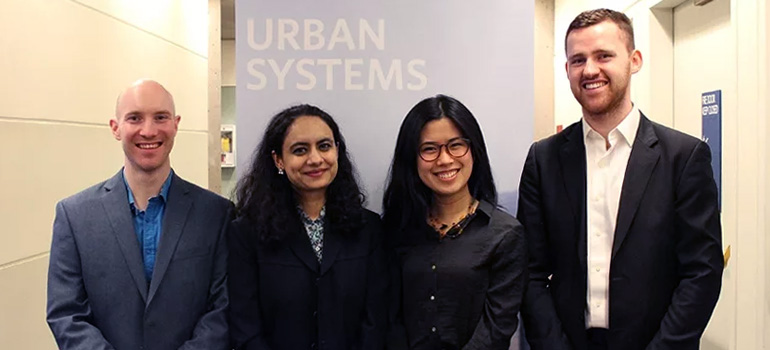
How can cities increase public engagement? Students in the Master of Engineering Leadership (MEL) in Urban Systems: Infrastructure for Resilient Cities program worked with the City of New Westminster to explore how adding to the number of free public Wi-Fi spots in the city’s high-pedestrian traffic areas could enhance citizen engagement.
New Westminster was one of the first cities in BC to install free Wi-Fi access points in public facilities such as community centres, arenas, city hall and the library. As part of an effort to engage with more citizens through social and civic outreach programs, municipal staff were interested in assessing the viability of adding new Wi-Fi access in busy public locations.
Nikita Bhalla, Colin Jeffery, Andrew McLeod and Amy Lu met with stakeholders from the City of New Westminster in early 2018 to understand the project’s overarching goals. The MEL in Urban Systems students then came up with a series of practical recommendations based on site visits, analyzing data provided by staff, and researching public Wi-Fi implementation strategies in other cities.
The team used city-supplied data from New Westminster’s existing public Wi-Fi network to identify user behaviour patterns based on location, time and purpose. This enabled the students to develop profiles of typical users and make predictions about Wi-Fi usage patterns.
They then looked at gaps in coverage between existing public Wi-Fi hubs and popular pedestrian areas such as parks and along the waterfront.
By analyzing data on current Wi-Fi usage through the lens of current infrastructure gaps, the team was able to suggest locations where the city would get the greatest return on investment in Wi-Fi technology. “This enabled us to make accurate assumptions about high-potential spots based on current use and location data,” says Amy.
They also looked at how other municipalities use public Wi-Fi to engage with their residents.
“We saw that many cities in Canada use public Wi-Fi as a platform to enable greater communication between citizens and the city,” says Nikita.
This is already being done in New Westminster: the city’s SeeClickFix app, for example, is a popular tool for notifying the municipality of civic infrastructure issues that need addressing.
“Making it easier for the public to take a photo of a pothole or burned-out street light and upload that information to the city gives staff high-quality location-specific data they can use to better respond to service requests and meet residents’ needs,” says Andrew.
Public Wi-Fi hubs also improve communication between the city and its residents, making it easier for people to receive and access information about important municipal issues, changes to garbage and recycling collection days, or upcoming events.
However, the value of public Wi-Fi goes beyond easier communication between residents and the municipality, or being able to check email while enjoying New Westminster’s public spaces. “Free Wi-Fi creates equal access for everyone,” says Colin, adding that this is an important social justice and equity issue given that so many facets of modern life depend on the Internet – from searching for government assistance programs to applying for jobs online.
The students recommended a three-phase 10-year plan to roll out additional free Wi-Fi across New Westminster, starting in high-pedestrian traffic areas along the busy Fraser River waterfront. Their final report outlined the challenges and strengths of available technology options – including mesh networks, Wi-Fi 2.0 and Self-Organizing Networks – as well as barriers to implementation.
Developing recommendations for urban infrastructure projects like this requires an integrated and holistic understanding of the issues at play. With their backgrounds in architecture (Amy), urban planning (Andrew), mechanical engineering (Colin) and civil and structural engineering (Nikita), the four Urban Systems students were able to consider complex issues and make recommendations from a multidisciplinary and nuanced perspective.
“I think this project really shows the powerful partnerships that can develop between universities and cities,” says Andrew. “In this particular case, we have a municipality tapping into our shared pool of knowledge and experience. It’s also a great opportunity for us as students to gain valuable project and work experience.”
Following graduation, Nikita Bhallah now works as an Engineering and Environmental Advisor with the Municipal Natural Assets Initiative; Colin Jeffery is a Project and Utility Management Engineer with Kerr Wood Leidal Associates, Ltd.; and Andrew McLeod works at SmartCentres REIT as a Development Associate.
Learn more about the UBC Master of Engineering Leadership (MEL) in Urban Systems: Infrastructure for Resilient Cities.
